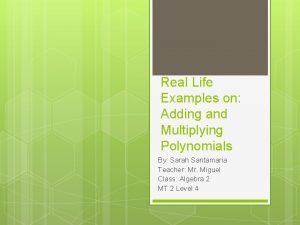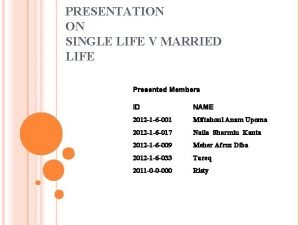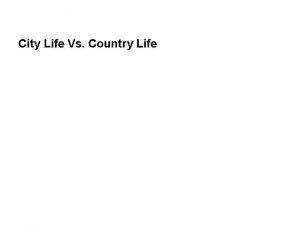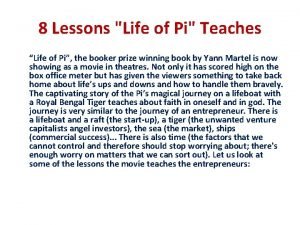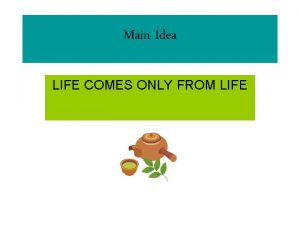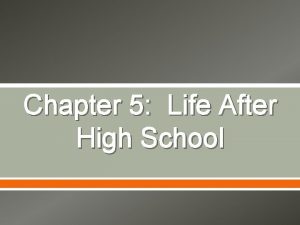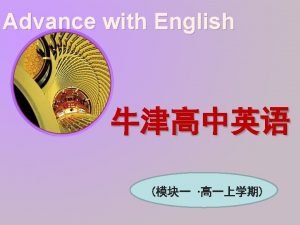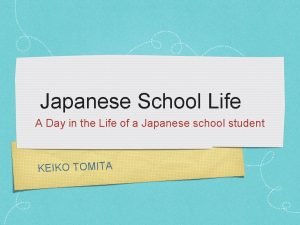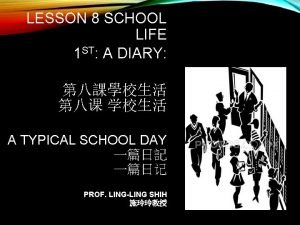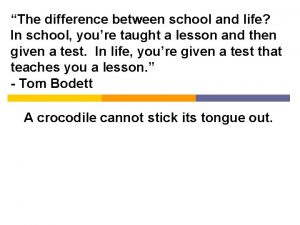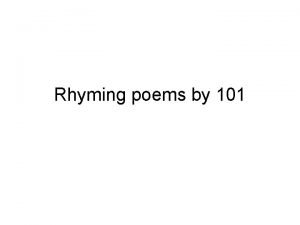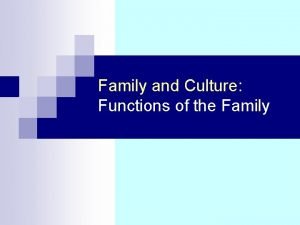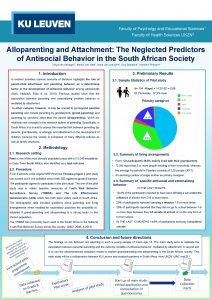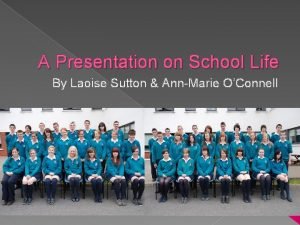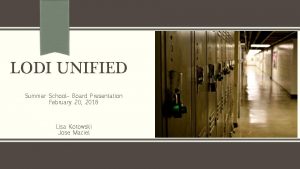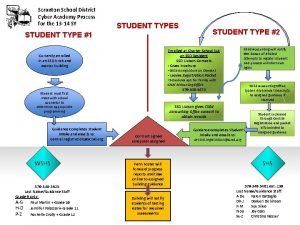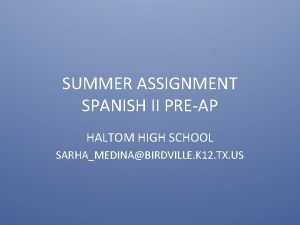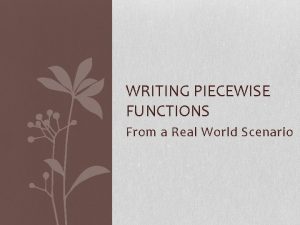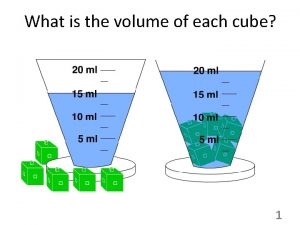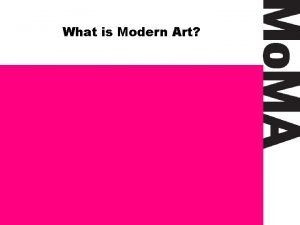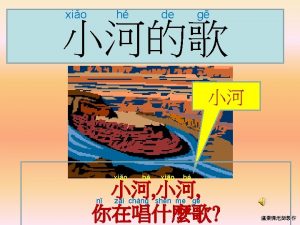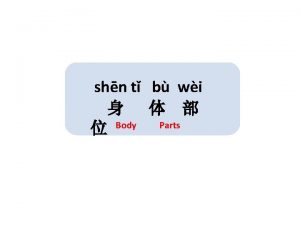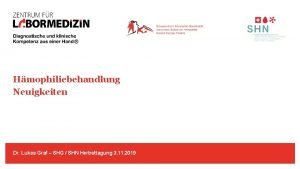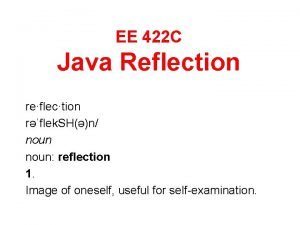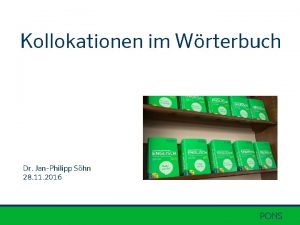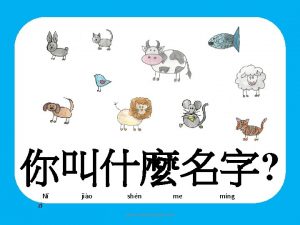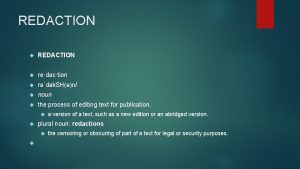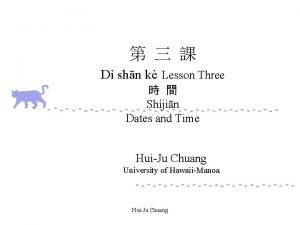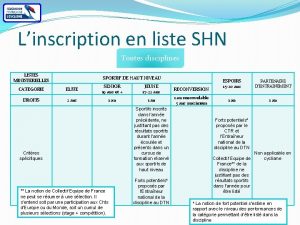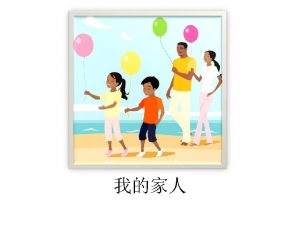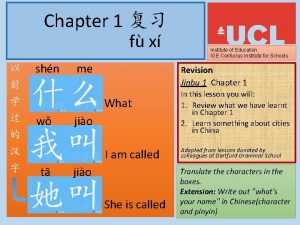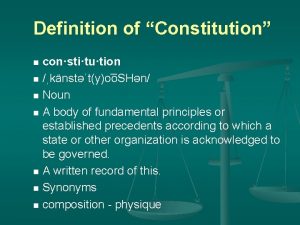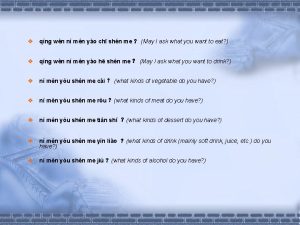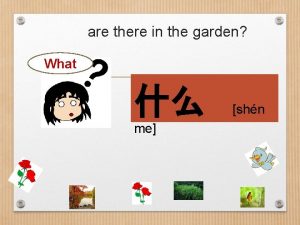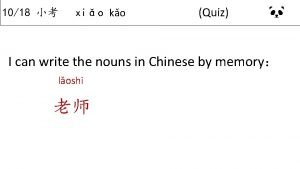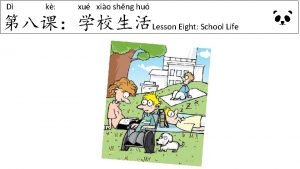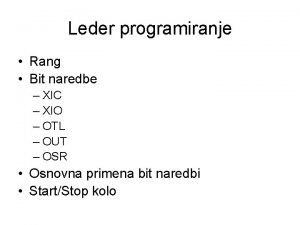xu xio hu g shn School Life LI
















































- Slides: 48

xué xiào 校 学 huó g shēn 活 生 School Life LI XIN YU

piān 篇 (measure word for essays, articles, etc. )

rì jì 日记 diary


lèi 累 tired

A: 你今天累吗? nǐ jīn tiān lèi ma? Are you tired today? B: 我今天很累。 wǒ jīn tiān hěn lèi. I am very tired today.

yǐ jīng 已经 already

qǐ chuáng 起床 to get up

chuáng 床 bed

学生已经起床去上课了。 xué sheng yǐ jīng qǐ chuáng qù shàng kè le. The student has already got up to go to class.

Series of Verbs/Verb Phrases A number of verbs or verb phrases can be used in succession to represent a series of actions. The sequential order of these verbs or verb phrases usually coincides with the temporal order of the actions. 1、他常常去高小音家吃饭。 tā cháng qù gāo xiǎo yīn jiā chī fàn 。 He often goes to eat at Gao Xiaoyin`s place. 2、下午我要到图书馆去看书。 xià wǔ wǒ yào dào tú shū guǎn qù kàn shū 。 This afternoon I will go to the library to read.

Series of Verbs/Verb Phrases A number of verbs or verb phrases can be used in succession to represent a series of actions. The sequential order of these verbs or verb phrases usually coincides with the temporal order of the actions. 3、我明天想找同学去打球。 wǒ míng tiān xiǎng zhǎo tóng xué qù dǎ qiú. I`d like to find some classmates to play ball with me tomorrow. 4、你明天来我家吃晚饭吧。 nǐ míng tiān lái wǒ jiā chī wǎn fàn ba. Come and have dinner at my house tomorrow.

xǐ zǎo 洗澡 to take a bath/shower

zǎo fàn 早饭 breakfast

yì biān 一边 simultaneously; at the same time

一边. . . (yì biān. . . ) This structure denotes the simultaneity of two ongoing actions. In general, the word or phrase for the action that started earlier follows the first 一边 (yì biān), while that for the action that started later follows the second 一 边(yì biān). 1、我们一边吃饭,一边练习说中文。 wǒ men yì biān chī fàn ,yì biān liàn xí shuō zhōng wén. We practiced speaking Chinese while having dinner. 2、他常常一边吃饭一边看电视。 tā cháng yì biān chī fàn yì biān kàn diàn shì. He often eats and watches TV at the same time.

一边. . . (yì biān. . . ) Generally, the verb that follows the first 一边(yì biān) indicates the principal action for the moment, while the one that follows the second 一边(yì biān) denotes an accompanying action. 3、我一边洗澡一边唱歌。 wǒ yì biān xǐ zǎo,yì biān chàng gē. I sang while taking a shower. 4、我妹妹喜欢一边看书一边听音乐。 wǒ mèi mei xǐ huan yì biān kàn shū yì biān tīng yīn yuè. My younger sister loves listening to music while she reads.

一边. . . (yì biān. . . ) Generally, the verb that follows the first 一边(yì biān) indicates the principal action for the moment, while the one that follows the second 一边(yì biān) denotes an accompanying action. 1. 我一边________。 wǒ yì biān ______. 2. 我喜欢一边_________。 wǒ xǐ huan yì biān ______. 3. 我常常一边_________。 wǒ cháng yì biān _________.

jiāo shì 教室 classroom

fā yīn 发音 pronunciation

xīn jiù 新 旧 new worn

diàn nǎo 电脑 computer

电脑(diàn nǎo, computer) The usual colloquial term for a computer is 电脑(diàn nǎo), literally, “electric brain. ” A more formal term, especially in mainland China, is 电子计算机(diàn zǐ jì suàn jī) or “electronic computing machine, ” or simply 计算机(jì suàn jī). But in Taiwan 计算机(jì suàn jī) means a calculator. In mainland China, a calculator is called 计算器(jì suàn qì).

nǎo 脑 brain

zhōng wǔ 中午 noon

cān tīng 餐厅 dining room, cafeteria

wǔ fàn 午饭 lunch, midday meal

同学们在餐厅吃午饭。 tóng xué men zài cān tīng chī wǔ fàn. Students have lunch in the dining room.

shàng wǎng 上网 to go online; to surf the internet

sù shè 宿舍 dormitory

nàr 那儿 there

zhèng zài 正在 in the middle of (doing something)

The Adverb 正在(zhèng zài, be doing. . . ) The adverb 正在(zhèng zài) denotes an ongoing or progressive action at a certain point of time. It is more emphatic than 在(zài) when it serves the same function. 1. A: 李友,你在做什么? lǐ yǒu, nǐ zài zuò shén me? Li You, what are you doing? B: 我在练习写汉字。 wǒ zài liàn xí xiě hàn zì. I`m practicing writing Chinese characters

The Adverb 正在(zhèng zài, be doing. . . ) The adverb 正在(zhèng zài) denotes an ongoing or progressive action at a certain point of time. It is more emphatic than 在(zài) when it serves the same function. 2. 我们现在正在上课,你别打电话。 wǒ men xiàn zài zhèng zài shàng kè ,nǐ bié dǎ diàn huà. We are having a class right now. Don`t make phone calls. 3. 我昨天到他宿舍的时候,他正在练习发音。 wǒ zuó tiān dào tā sù shè de shí hou ,tā zhèng zài liàn xí fā yīn. When I got to his dorm yesterday, he was in the middle of practicing pronunciation.

The Adverb 正在(zhèng zài, be doing. . . ) The adverb 正在(zhèng zài) denotes an ongoing or progressive action at a certain point of time. It is more emphatic than 在(zài) when it serves the same function. 4. A: 你知道不知道王老师在哪儿? nǐ zhī dao bù zhī dào wáng lǎo shī zài nǎr ? Do you know where Teacher Wang is? B: 他正在办公室开会。 tā zhèng zài bàn gōng shì kāi huì. He is having a meeting in his office.

yǐ qián 以前 before

yǐ hòu 以后 after

gào su 告诉 to tell

zhī dào 知道 to know

The Position of Time-When Expressions Time-when expressions come before the verb. They often appear after the subject. However, they sometimes precede the subject under certain discourse conditions. In this lesson, we focus on practicing the ones positioned after the subject. 1、我们十点上课。 wǒ men shí diǎn shàng kè. We start the class at ten. 2、我们几点去? wǒ men jǐ diǎn qù ? What time are we going?

The Position of Time-When Expressions Time-when expressions come before the verb. They often appear after the subject. However, they sometimes precede the subject under certain discourse conditions. In this lesson, we focus on practicing the ones positioned after the subject. 3、你什么时候睡觉? nǐ shén me shí hou shuì jiào ? What time do you go to bed ? 4、他明天上午八点来。 tā míng tiān shàng wǔ bā diǎn lái He will come at eight tomorrow morning.

The Position of Time-When Expressions 1、你什么时候吃早饭? nǐ shén me shí hou chī zǎo fàn? What time do you have breakfast? 2、你什么时候吃午饭? nǐ shén me shí hou chī wǔ fàn ? What time do you have lunch? 3、你什么时候吃晚饭? nǐ shén me shí hou chī wǎn fàn ? What time do you have dinner?

The Adverb 就(jiù) The adverb 就(jiù) connecting two verbs or verb phrases indicates that the second action happens as soon as the first one is completed. 1、他今天早上起床以后就听中文录音了。 tā jīn tiān zǎo shang qǐ chuáng yǐ hòu jiù tīng zhōng wén lù yīn le. He listened to the Chinese recordings right after he got up this morning. 2、王朋写了信以后就去睡觉了。 wáng péng xiě le xìn yǐ hòu jiù qù shuì jiào le. Wang Peng went to bed right after he had finished writing the letter.

The Adverb 就(jiù) The adverb 就(jiù) connecting two verbs or verb phrases indicates that the second action happens as soon as the first one is completed. 3、我做了功课以后就去朋友家玩儿。 wǒ zuò le gōng kè yǐ hòu jiù qù péng you jiā wánr. I will go to my friend`s for a visit right after I finish my homework.

The Particle 的(de) When a disyllabic or polysyllabic adjective modifies a noun, the particle 的(de) is usually inserted between the adjective and the noun, e. g. 漂亮的学校(piào liang de xué xiào, beautiful schools) , 容易的汉字 (róng yì de hàn zì, easy characters), 有意思的电影(yǒu yì si de diàn yǐng, interesting movies). However, with monosyllabic adjectives, 的 (de) is often omitted, e. g. , 新课文(xīn kè wén, new lesson texts), 新电 脑(xīn diàn nǎo, new computers), 大教室(dà jiào shì, big classrooms); 好老师(hǎo lǎo shī, good teachers). If the adjective is preceded by 很 (hěn), however, 的(de) cannot be dropped, e. g. , 很新的电脑(hěn xīn de diàn nǎo, very new computers); 很大的教室(hěn dà de jiào shì, very big classrooms); 很好的老师(hěn hǎo de lǎo shī )


How many classes did Li You have? What did Li You do in the library? What did Li You do after dinner?

e c i t c a r P e g a Langu
 Xio
Xio Vocabulary city life
Vocabulary city life City life vs country life
City life vs country life When do we use polynomials in real life
When do we use polynomials in real life Single life or married life which is better
Single life or married life which is better Slidetodoc.com
Slidetodoc.com Country life vs city life compare /contrast
Country life vs city life compare /contrast City life vs country life
City life vs country life What i need to learned about life of pi
What i need to learned about life of pi How do we treat the life the life how we treat
How do we treat the life the life how we treat Life that is truly life
Life that is truly life The idea life comes from life is
The idea life comes from life is Freetutorical.com harvest land
Freetutorical.com harvest land The fourth foundation pay cash for college
The fourth foundation pay cash for college Give two pieces of advice from tablets for school
Give two pieces of advice from tablets for school What's next thinking about life after high school
What's next thinking about life after high school School life unit 1
School life unit 1 Japanese school life
Japanese school life Budgeting for life after high school
Budgeting for life after high school Diary about school life
Diary about school life When it comes to thinking about life after high school
When it comes to thinking about life after high school The difference between school and life
The difference between school and life Poems that rhyme
Poems that rhyme Why goal is important
Why goal is important What is family life in school
What is family life in school School of life sciences ukzn
School of life sciences ukzn Presentation on school life
Presentation on school life Our own english high school sharjah boys branch
Our own english high school sharjah boys branch Japan kindergarten hat
Japan kindergarten hat Lodi unified summer school
Lodi unified summer school Crescenta valley high school graduation 2021
Crescenta valley high school graduation 2021 Indian school wadi kabir uniform
Indian school wadi kabir uniform Scranton school district
Scranton school district Assignment in spanish
Assignment in spanish Your online life, permanent as a tattoo
Your online life, permanent as a tattoo You light up my life chemistry lab answer key
You light up my life chemistry lab answer key Real life examples of virtue ethics
Real life examples of virtue ethics Piecewise function examples
Piecewise function examples Eternal samsara
Eternal samsara Workshop worklife balance
Workshop worklife balance Wolverine animal life cycle
Wolverine animal life cycle Early life of william wordsworth
Early life of william wordsworth William shakespeare's timeline
William shakespeare's timeline Prince escalus
Prince escalus Non domesticated animals and uncultivated plant life
Non domesticated animals and uncultivated plant life When life kicks you let it kick you forward
When life kicks you let it kick you forward Blowfly life cycle diagram
Blowfly life cycle diagram Virginia's 3 major watersheds
Virginia's 3 major watersheds Cezanne still life
Cezanne still life



